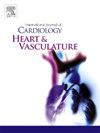Dissecting causal relationships between immune cells, blood metabolites, and aortic dissection: A mediation Mendelian randomization study
IF 2.5
Q2 CARDIAC & CARDIOVASCULAR SYSTEMS
引用次数: 0
Abstract
Background
There exists a robust correlation between the infiltration of immune cells and the pathogenesis of aortic dissection (AD). Moreover, blood metabolites serve as immunomodulatory agents within the organism, influencing the immune system’s response and potentially playing a role in the development of AD. Nevertheless, the intricate genetic causal nexus between specific immune cells, blood metabolites, and AD remains partially elucidated.
Objectives
This study aims to elucidate the causal relationships between specific immune cell types and the risk of developing AD, mediated by blood metabolites, using Mendelian Randomization (MR) methods.
Methods
We undertook a comprehensive investigation of 731 immune cell types through the analysis of published genome-wide association studies (GWAS). Our methodology hinged on the application of two-sample Mendelian randomization (MR) and mediator MR analyses, prioritizing blood metabolites as potential intermediary factors and AD as the principal outcome of interest. The primary statistical method employed was inverse variance-weighted estimation, complemented by a variety of sensitivity analyses to reinforce our conclusions. The entirety of our statistical analyses was executed on the R software platform.
Results
Our analyses elucidated that three immune cell types exhibited a positive correlation with the incidence of AD, whereas two immune cell types were inversely associated with AD risk. Significantly, our mediation Mendelian randomization (MR) findings identified Benzoate as a pivotal mediator in the influence of CD19 on IgD − CD38br cells on AD, with a mediation proportion of 5.38 %. Additionally, N-acetylproline was determined to mediate the effect of CD24 on IgD- CD38- cells on AD, accounting for a mediation proportion of 13.70 %. Furthermore, Carnitine C5:1 was found to mediate the effect of CD28 on secreting T regulatory (Treg) cells on AD, with a mediation proportion of 17.80 %.
Conclusions
These findings offer a nuanced understanding of the pathophysiological mechanisms underlying AD, thereby advancing the precision medicine paradigm in the clinical management of AD.
Abbreviations: AD: aortic dissection; AA: aortic aneurysm; GWAS: genome-wide association study; MR: Mendelian randomization; TSMR: two-step Mendelian randomization; Treg: secreting T regulatory cell; VSMC: vascular smooth muscle cell; MMP: matrix metalloproteinase; ROS: reactive oxygen species; IV: instrumental variable; SNP: single-nucleotide polymorphism; IVW: inverse variance weighted; LDSC: linkage disequilibrium score regression; OR: odds ratio; CI: confidence interval; LD: linkage disequilibrium; AC: absolute cell; MFI: median fluorescence intensity; MP: morphological parameter; RC: relative cell; CLSA: Canadian Longitudinal Study of Aging; Lp(a): Lipoprotein a; OxPL: oxidised phospholipid; NMDAR: N-methyl-d-aspartate glutamate receptor; STROBE-MR: Strengthening the Reporting of Observational Studies in Epidemiology using Mendelian Randomization.
剖析免疫细胞、血液代谢物与主动脉夹层之间的因果关系:调解孟德尔随机研究
背景免疫细胞的浸润与主动脉夹层(AD)的发病机制之间存在着密切的联系。此外,血液中的代谢物可作为机体内的免疫调节剂,影响免疫系统的反应,并可能在主动脉夹层的发病中发挥作用。本研究旨在利用孟德尔随机化(Mendelian Randomization,MR)方法,阐明血液代谢物介导的特定免疫细胞类型与AD发病风险之间的因果关系。方法我们通过分析已发表的全基因组关联研究(GWAS),对731种免疫细胞类型进行了全面调查。我们的方法主要是应用双样本孟德尔随机化(MR)和中介MR分析,将血液代谢物作为潜在的中介因素,将AD作为主要的研究结果。我们采用的主要统计方法是反方差加权估计法,并辅以各种敏感性分析来强化我们的结论。我们的所有统计分析都是在 R 软件平台上进行的。结果我们的分析表明,三种免疫细胞类型与 AD 发病率呈正相关,而两种免疫细胞类型与 AD 风险呈反相关。值得注意的是,我们的调解孟德尔随机化(MR)研究结果发现,苯甲酸盐是影响 IgD - CD38br 细胞的 CD19 对 AD 影响的关键调解因子,调解比例为 5.38%。此外,N-乙酰脯氨酸被确定为CD24对IgD- CD38-细胞对AD影响的中介因子,其中介比例为13.70%。此外,还发现肉碱 C5:1 能介导 CD28 对分泌 T 调节(Treg)细胞对 AD 的影响,介导比例为 17.80%。结论这些研究结果让人们对 AD 的病理生理机制有了细致入微的了解,从而推进了 AD 临床治疗中的精准医学范式:缩写:AD:主动脉夹层;AA:主动脉瘤;GWAS:全基因组关联研究;MR:孟德尔随机化;TSMR:两步孟德尔随机化;Treg:分泌型 T 调节细胞;VSMC:血管平滑肌细胞;MMP:基质金属蛋白酶;ROS:活性氧;IV:工具变量;SNP:单核苷酸多态性;IVW:反方差加权;LDSC:连锁不平衡得分回归;OR:几率比;CI:置信区间;LD:连锁不平衡;AC:绝对细胞;MFI:中位荧光强度;MP:形态参数;RC:相对细胞;CLSA:加拿大老龄化纵向研究;Lp(a):Lp(a):脂蛋白 a;OxPL:氧化磷脂;NMDAR:N-甲基-d-天冬氨酸谷氨酸受体;STROBE-MR:利用孟德尔随机化加强流行病学中观察性研究的报告。
本文章由计算机程序翻译,如有差异,请以英文原文为准。
求助全文
约1分钟内获得全文
求助全文
来源期刊

IJC Heart and Vasculature
Medicine-Cardiology and Cardiovascular Medicine
CiteScore
4.90
自引率
10.30%
发文量
216
审稿时长
56 days
期刊介绍:
IJC Heart & Vasculature is an online-only, open-access journal dedicated to publishing original articles and reviews (also Editorials and Letters to the Editor) which report on structural and functional cardiovascular pathology, with an emphasis on imaging and disease pathophysiology. Articles must be authentic, educational, clinically relevant, and original in their content and scientific approach. IJC Heart & Vasculature requires the highest standards of scientific integrity in order to promote reliable, reproducible and verifiable research findings. All authors are advised to consult the Principles of Ethical Publishing in the International Journal of Cardiology before submitting a manuscript. Submission of a manuscript to this journal gives the publisher the right to publish that paper if it is accepted. Manuscripts may be edited to improve clarity and expression.
 求助内容:
求助内容: 应助结果提醒方式:
应助结果提醒方式:


